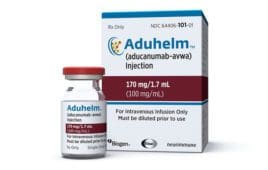
Researchers have uncovered an enzyme and a biochemical pathway they believe may lead to the identification of drugs that could inhibit the production of beta-amyloid protein, the toxic initiator of Alzheimer’s disease (AD).
AD is characterized by the accumulation of beta-amyloid plaques, tau fibers and the loss of neurons in the brain. Currently, no FDA-approved drugs exist that attack the cause of disease.
After screening more than 75,000 small molecules, researchers at Boston University School of Medicine (BUSM) and Boston University discovered a molecule that reduced the formation of amyloid beta protein in cells grown in petri dishes.
“But more importantly we discovered the target of these molecules, an enzyme and a biochemical pathway that can be inhibited in Alzheimer’s to decrease amyloid production,” explained corresponding author Carmela Abraham, PhD, professor of biochemistry at BUSM.
According to the researchers, the inhibitors of this pathway are also anti-cancer therapies and are another example where cancer and neurodegeneration cross paths.
The researchers are optimistic that their study will open a new avenue of research to stall or even stop the buildup of beta-amyloid protein. “We are in desperate need of drugs that can treat or even prevent Alzheimer’s disease. Additional studies to improve our small molecules could lead to a disease-modifying pill for the millions who suffer from AD or those at high risk of developing the disease.”
Filed Under: Neurological Disease



